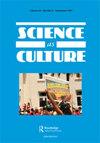Monstrous Motherhood – Women on the Edge of Reproductive Age
IF 2.4
3区 哲学
Q1 CULTURAL STUDIES
引用次数: 5
Abstract
ABSTRACT Women using reproductive technologies to extend the period they can procreate challenge nature and culture, and traverse the boundary between what is considered normal and abnormal. In other words, women inhabit the potentialities of reproductive change found in Margrit Schildrich's figure of the monstrous. Haraway and Dumit's implosion method is a useful vehicle for following women who are on the edge of reproductive age through legislation, the media, and the fertility clinic, revealing how maternal age is disciplined and (re)configured. While older women who conceived naturally are viewed as acceptable mothers, those who used technological assistance are perceived with uneasiness. The dichotomy of the natural and the unnatural is especially prevalent as an ordering principle in legislation, but it is (re)configured in media reports and clinical settings where a youthful appearance mental attitude and behaviour, can mitigate age. While the discussion about an age limit for parenthood is important, the nature-based ideas that are central to regulating women's bodies but not men's should be challenged. The way that moral boundaries emerge calls for legislation, media perceptions, and clinical practices to be adjusted to include new modes of ordering that are less repressive of women, their bodies, and their reproductive lives.怪异的母性——处于生育年龄边缘的女性
摘要利用生殖技术延长生育期的女性挑战自然和文化,跨越正常和异常之间的界限。换言之,女性拥有Margrit Schildrich笔下怪物形象中生殖变化的潜力。Haraway和Dumit的内爆方法是一种有用的工具,可以通过立法、媒体和生育诊所跟踪处于生育年龄边缘的女性,揭示产妇年龄是如何被约束和(重新)配置的。自然受孕的老年妇女被视为可接受的母亲,而那些使用技术援助的老年妇女则被视为不安。自然和非自然的二分法作为一项命令原则在立法中尤其普遍,但在媒体报道和临床环境中,年轻人的外表、心理态度和行为可以减轻年龄。虽然关于为人父母的年龄限制的讨论很重要,但对调节女性身体而非男性身体至关重要的基于自然的观念应该受到挑战。道德界限的出现要求对立法、媒体观念和临床实践进行调整,以纳入对女性、她们的身体和生殖生活不那么压抑的新秩序模式。
本文章由计算机程序翻译,如有差异,请以英文原文为准。
求助全文
约1分钟内获得全文
求助全文
来源期刊

Science As Culture
Multiple-
CiteScore
5.20
自引率
3.80%
发文量
28
期刊介绍:
Our culture is a scientific one, defining what is natural and what is rational. Its values can be seen in what are sought out as facts and made as artefacts, what are designed as processes and products, and what are forged as weapons and filmed as wonders. In our daily experience, power is exercised through expertise, e.g. in science, technology and medicine. Science as Culture explores how all these shape the values which contend for influence over the wider society. Science mediates our cultural experience. It increasingly defines what it is to be a person, through genetics, medicine and information technology. Its values get embodied and naturalized in concepts, techniques, research priorities, gadgets and advertising. Many films, artworks and novels express popular concerns about these developments. In a society where icons of progress are drawn from science, technology and medicine, they are either celebrated or demonised. Often their progress is feared as ’unnatural’, while their critics are labelled ’irrational’. Public concerns are rebuffed by ostensibly value-neutral experts and positivist polemics. Yet the culture of science is open to study like any other culture. Cultural studies analyses the role of expertise throughout society. Many journals address the history, philosophy and social studies of science, its popularisation, and the public understanding of society.
 求助内容:
求助内容: 应助结果提醒方式:
应助结果提醒方式:


